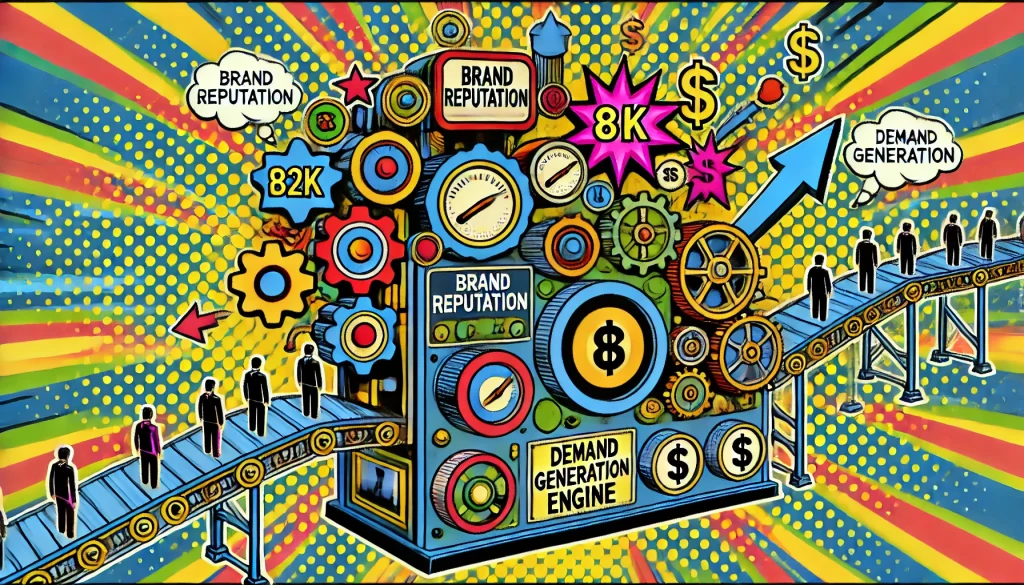Let’s rip the band-aid off right away—B2B marketing is fundamentally inefficient. It’s a tough pill to swallow, especially when we’re all aiming to make every dollar of our marketing investments count. This doesn’t change whether you’re grappling with the winds of economic uncertainty or sailing in the calm seas of prosperity. But why exactly is B2B marketing inherently inefficient, and can we successfully tackle this? Let’s explore.
The Law of Numbers and the Illusion of Scale
To comprehend the inefficiency, we must start with the fundamental law of numbers. When defining their Total Addressable Market (TAM), B2B companies narrow down potential prospects based on criteria like industry type, company size, employee count, and geographic location. While the resulting pool of thousands of businesses may seem vast, it’s merely a small ripple in the ocean of global commerce.
Take a moment to reflect on this: If your TAM consists of tens of thousands of companies, it’s easy to fall into the trap of believing you have a large audience. However, when you measure this against the backdrop of millions of businesses worldwide, your TAM represents a minute fraction of the whole.
Can AI Save the Day? Not Quite…
In this era of unprecedented innovation, AI-driven technology is often hailed as the silver bullet for inefficiency. However, this is not always the case. The reality is that the majority of digital marketing tools, originally designed with B2C in mind, fall short when deployed in the B2B arena.
For instance, consider paid search programs—an investment yielding instant gratification through clicks and conversions. The immediate results can be so enticing that marketers might allocate an unreasonable portion of their budget towards this channel. But dig a bit deeper, and you’ll uncover that a staggering 95% of these clicks and conversions come from companies outside your TAM. Suddenly, your perceived cost-per-click skyrockets when adjusted for this reality.
Addressing B2B Marketing Inefficiency: A Roadmap
While it’s easy to get disheartened by these facts, remember: difficult doesn’t equate to impossible. Acknowledging these challenges is the first step towards paving your road to B2B marketing efficiency. And trust me, the journey is well worth it.
Here’s the bitter truth: Across all digital channels in the B2B domain, only about 15% of website traffic comes from companies within the marketer’s TAM. This is the market reality given the precision required in B2B marketing and the inherent limitations of most technologies.
But over the years, we’ve seen significant advancements in B2B marketing solutions aimed at addressing these inefficiencies. Companies like Demandbase, LinkedIn, and 6Sense, among others, have contributed to these advances, inching us closer to solving the B2B marketing conundrum.
Taking the First Steps: Measure, Understand, Normalize
What does the first step towards more efficient B2B marketing look like? Start with a straightforward Key Performance Indicator (KPI) like dollar-per-TAM-visit. This metric allows you to rank vendors and channels on a level playing field, enabling smarter investment decisions. It’s an approach that’s easy to comprehend, ensuring buy-in from key stakeholders across your organization.
The subsequent step involves normalizing your results. Use the dollar amount as a common denominator to equalize the efficiency of different vendors or channels in attracting and engaging your customers.
Translating Efficiency into Business Impact
Once you have this process in place, you can then translate marketing efficiency into tangible business impact—pipeline growth. By doing so, you lay the groundwork for a modern, predictable way to attribute marketing investment to business growth.
Yes, B2B marketing may seem like a labyrinth of inefficiencies, but within this complexity lies numerous opportunities to elevate your reach and effectiveness. The journey towards efficiency is about understanding the landscape, recognizing the unique challenges, and reorienting your approach to navigate these intricacies successfully.
Embracing the Inefficiencies: A Paradigm Shift
Inefficiency is often viewed negatively. But in the case of B2B marketing, it might be time for a paradigm shift. Rather than striving to eliminate inefficiencies entirely—an uphill and potentially fruitless battle—embrace them as a part of the B2B marketing landscape.
Doing so allows you to refocus your efforts on gaining a deeper understanding of your target market and sharpening your strategies. It involves capitalizing on existing technologies, but also keeping an open mind about potential limitations and continuously seeking improvements.
Innovating within the Inefficiencies: The Path Forward
The path to B2B marketing efficiency lies in innovation within the inefficiencies. It’s about exploring new frontiers in AI, investing in platforms explicitly designed for B2B, and continually refining your approach based on data and insights.
Most importantly, it involves understanding your audience better—knowing not just who they are, but also their pain points, their goals, and how your product or service fits into their story.
And remember, every step towards greater efficiency is a stride towards increased business impact and growth. Because, at the end of the day, the true measure of B2B marketing success is not merely the number of clicks or conversions—it’s the value delivered to your business and, more importantly, to your customers.
Conclusion
In a world where efficiency is often the holy grail, B2B marketing stands as a unique challenge. But within this challenge lies the potential for innovation, growth, and ultimately, success. It’s time to embrace the inefficiencies, innovate within them, and pave the way for a more efficient, impactful future in B2B marketing.
Let’s embark on this journey together and make every dollar of your B2B marketing investment count! Drop us a message or schedule a call with our B2B marketing experts for a free consultation.




